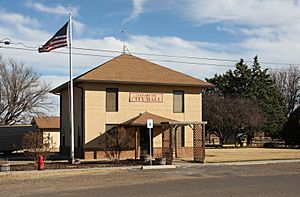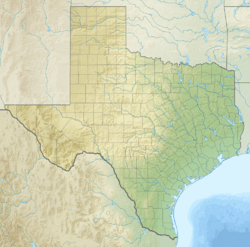Nazareth, Texas facts for kids
Quick facts for kids
Nazareth, Texas
|
|
|---|---|
|
City
|
|

Nazareth City Hall
|
|
| Country | |
| State | |
| County | Castro |
| Region | Llano Estacado |
| Established | 1902 |
| Founded by | Joseph Reisdorff |
| Area | |
| • Total | 0.36 sq mi (0.94 km2) |
| • Land | 0.36 sq mi (0.94 km2) |
| • Water | 0.00 sq mi (0.00 km2) |
| Elevation | 3,760 ft (1,150 m) |
| Population
(2020)
|
|
| • Total | 310 |
| • Density | 861/sq mi (330/km2) |
| Time zone | UTC-6 (CST) |
| ZIP code |
79063
|
| Area code | 806 |
| FIPS code | 48-50496 |
Nazareth is a small city in Castro County, Texas, USA. In 2020, about 310 people lived there. This was just a tiny bit less than the 311 people counted in 2010.
Contents
Where is Nazareth Located?
Nazareth is in the eastern part of Castro County. It sits on the high plains of the Llano Estacado. The city is about 12 miles (19 km) east of Dimmitt. Dimmitt is the main town, or county seat, of Castro County. Nazareth is also about 20 miles (32 km) west of Tulia.
The city covers a total area of about 0.36 square miles (0.94 square kilometers). All of this area is land.
A Look Back at Nazareth's History
How Nazareth Started
The town of Nazareth began thanks to a Catholic priest named Joseph Reisdorff. He moved to the area in 1902. Four farmers who wanted to buy land joined him. Father Reisdorff named his new community after the biblical town of Nazareth. He advertised for new settlers in German Catholic newspapers in the Midwest.
By September 1902, the first families started to arrive. A post office opened in 1903. Later that year, the Catholic community finished building their first church. By January 1904, Nazareth had 71 residents. The town was officially mapped out later that year.
Early Growth and Community Life
By 1905, Nazareth had more than just a church. It also had a blacksmith shop, a store, and a school. In 1906, the community's cemetery was blessed. It became the only Catholic cemetery in the area. For many years, local church leaders helped manage the town.
In 1914, about 50 people lived in Nazareth. By 1927, the population grew to around 150.
Surviving the Dust Bowl
During the 1930s, the area faced the Dust Bowl. Huge dust storms swept through, destroying crops. This made farming very difficult. In 1933, the town's population dropped to an estimated 50 residents.
However, farming in Castro County got better in the 1940s. By 1941, about 200 people were living in Nazareth.
Population Changes Over Time
The number of people living in Nazareth changed a bit in the 1950s and 1960s. It went down to about 75 in 1955. Then it rose to an estimated 275 by 1964. The official census counted 274 people in 1970 and 299 in 1980.
Even in the mid-1980s, about 85% of the town's residents were Catholics. Church activities helped keep the community strong and connected. In 1990, the population was 293.
Who Lives in Nazareth?
| Historical population | |||
|---|---|---|---|
| Census | Pop. | %± | |
| 1980 | 299 | — | |
| 1990 | 293 | −2.0% | |
| 2000 | 356 | 21.5% | |
| 2010 | 311 | −12.6% | |
| 2020 | 310 | −0.3% | |
| U.S. Decennial Census 2020 Census |
|||
In 2000, there were 356 people living in Nazareth. There were 125 households, which are groups of people living together. Most households (93) were families.
About 46% of households had children under 18 living with them. Most households (68.8%) were married couples. The average household had 2.85 people. The average family had 3.43 people.
The population was spread out by age. About 34% were under 18. About 12% were 65 or older. The average age in the city was 32 years old.
Education and Sports in Nazareth
Nazareth Independent School District
The city of Nazareth has its own school system. It is called the Nazareth Independent School District.
Amazing Basketball Teams
Nazareth is famous for its successful basketball teams!
The Nazareth Swiftettes (the girls' team) have won an incredible 25 state championships. They achieved this over 47 years, from 1977 to 2023. This is a national record for public schools! In 2023, the Swiftettes won their fifth state title in seven years. They have also reached the "Final Four" of the Texas state tournament 31 times since 1976. ESPN.com even wrote an article about the town and its amazing women's basketball team in 2007.
The Nazareth Swifts (the boys' team) have also had great success in basketball. Since 1983, they have won more Regional Titles (18) and State Titles (6) than any other Texas 1A team.
Nazareth's Climate
Nazareth has a semi-arid climate. This means it gets some rain, but it's generally dry. This type of climate is often shown as "BSk" on climate maps.
See also
 In Spanish: Nazareth (Texas) para niños
In Spanish: Nazareth (Texas) para niños


